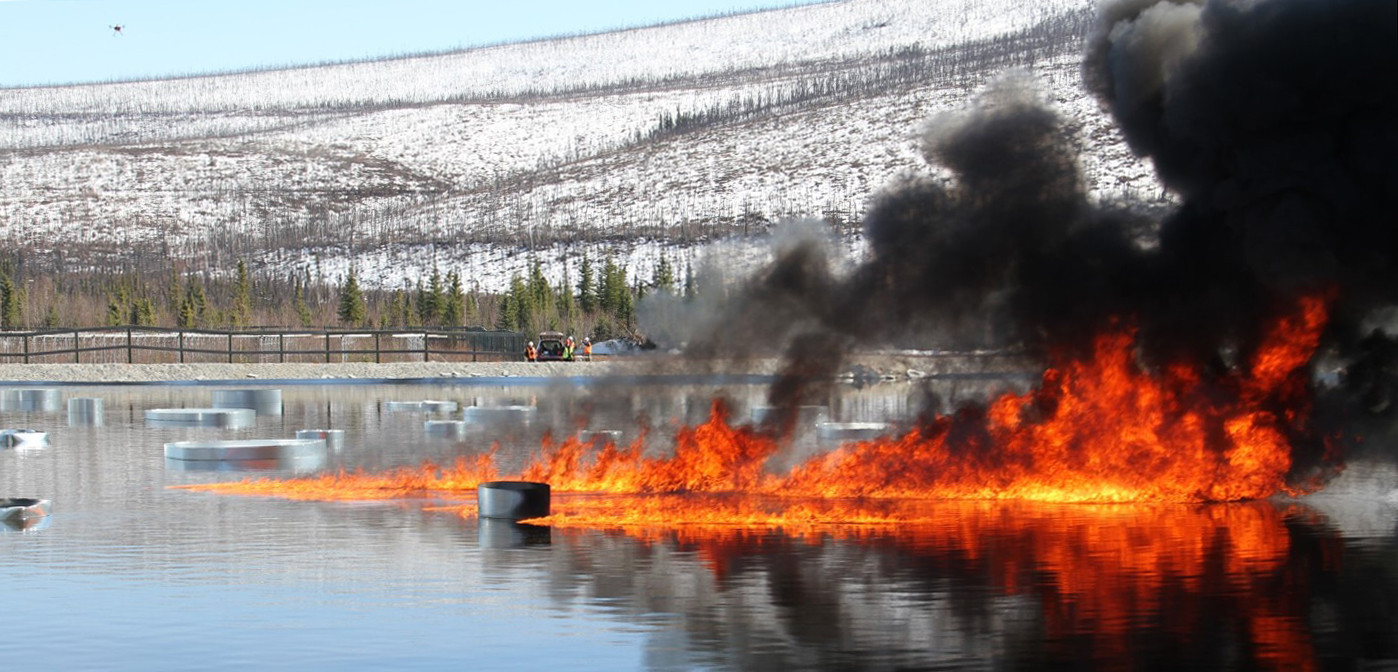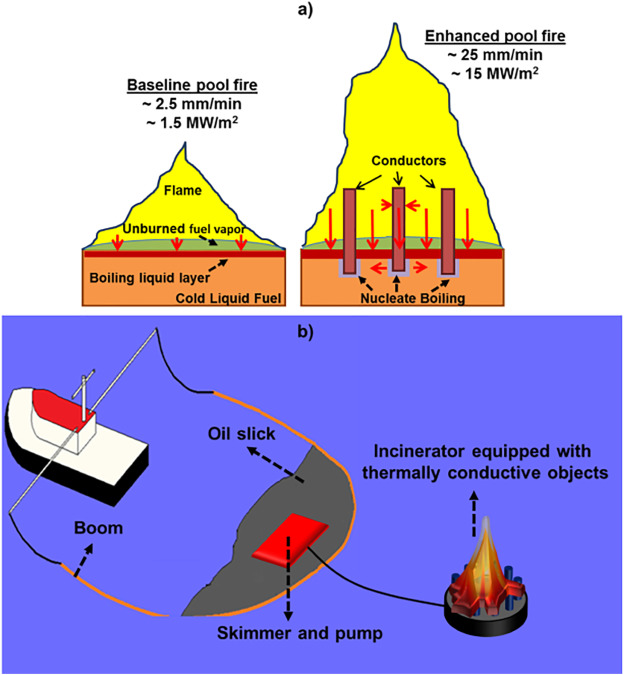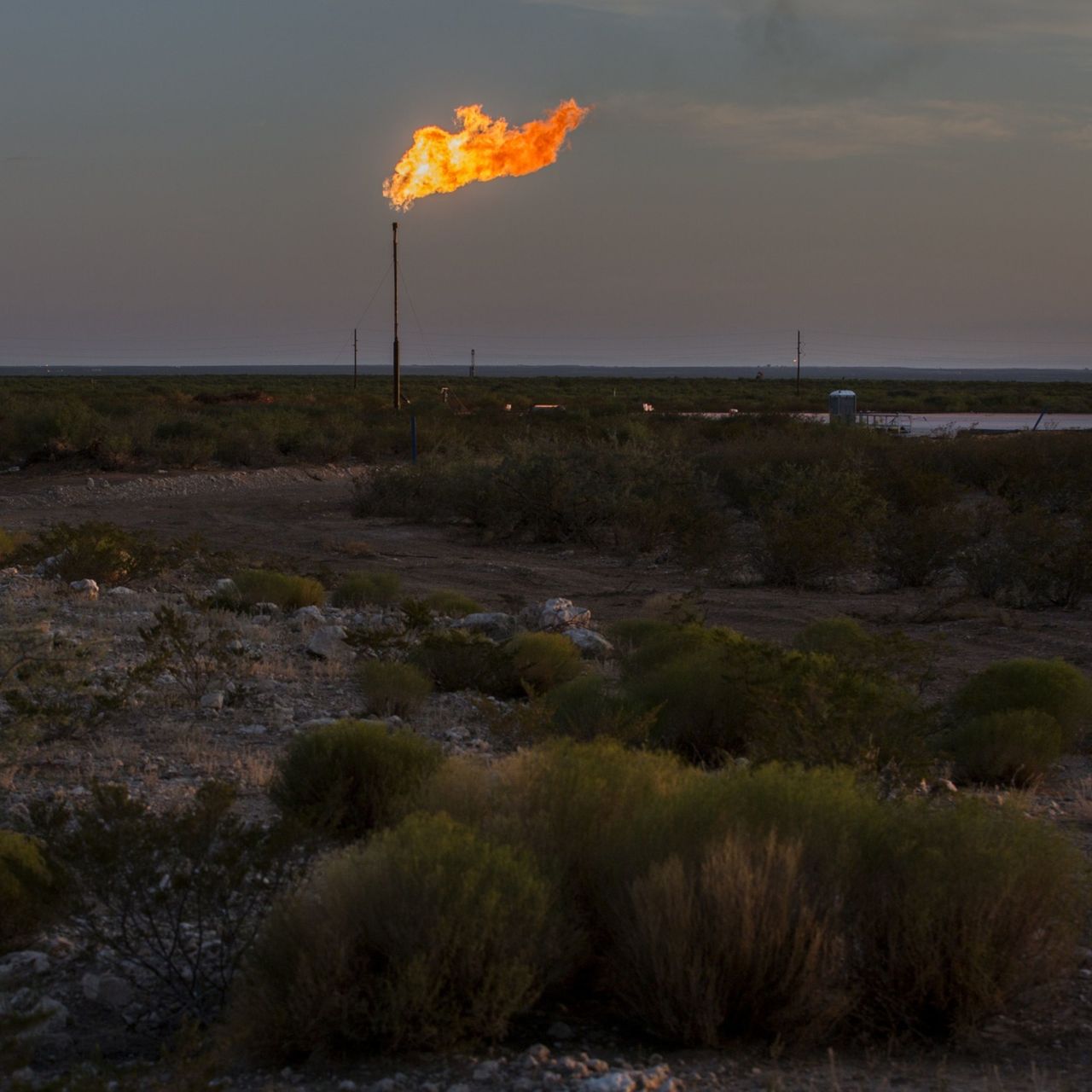A large pool of crude oil 60 feet in diameter and about 10 feet deep. It sits atop a 100ft. tall stone pillar with a 5ft radius hole that leads down into the earth. If the oil on top is exposed to a flame, would it just light up the surface, cause an explosion on the surface or blow up the entire pillar? Also does which of the above scenarios or any other depend on the size of the flame?
-
2$\begingroup$ What does the "5ft radius hole" have to do with the rest of the assembly? Does oil come up through it? $\endgroup$– Starfish PrimeCommented Mar 2, 2021 at 9:09
-
$\begingroup$ It depends here's a smaller version with kerosene youtube.com/watch?v=ga43J2ByPrs Here is gasoline on water youtube.com/watch?v=RqiggAI2Jds $\endgroup$– chasly - supports MonicaCommented Mar 2, 2021 at 9:42
-
3$\begingroup$ Setting fire to a pool of crude is possible but not very easy because generally speaking crude oil liquid does not burn. It need to be heated, or sprayed, or vaporized to really do the fire thing in air. (then it is self-sustaining+, of course) $\endgroup$– PcManCommented Mar 2, 2021 at 11:02
-
$\begingroup$ At worst you'd get a giant candle. Now, if someone were to push a pressurised jet of of air into the 5' hole... $\endgroup$– nzamanCommented Mar 2, 2021 at 17:11
-
1$\begingroup$ It burns (once you get it lit, which isn't all that easy). It's just an oil well fire. $\endgroup$– jamesqfCommented Mar 2, 2021 at 19:04
3 Answers
This paper talks about combustion
It is the fact that combustion properties of large-scale crude oil pool fire have great significance for security design and firefighting of current crude oil reserves. Burning rate, the flame shape and radiation intensity are the most important parameters for fires properties.
And this is an image of a fire on an oil spill in the Arctic
To have an explosion you would need to have finely dispersed droplets of oil in the air to greatly increase the combustion efficiency. With a calm pool that doesn't happen.
Incidentally, this is why it is dangerous to try to extinguish a flame in a frying pan with water: the water will sink below the frying oil, turn into vapor and explode nebulizing the oil above it and producing a fireball/explosion.
-
$\begingroup$ A grease fire doesn't "explode" (as in, there is no concussive force). It flares up and splatters around, it doesn't detonate or deflagrate. $\endgroup$ Commented Mar 2, 2021 at 22:52
-
4$\begingroup$ @KeithMorrison: In common vernacular usage, "make a giant fireball" and "explode" are considered synonymous. I'm sure this annoys pyro experts to no end, but it's how the language is used in practice. Personally, I blame Hollywood (which employs many of said pyro experts in the first place!). $\endgroup$– KevinCommented Mar 2, 2021 at 23:03
-
$\begingroup$ Yeah, well firefighters don't use that language (as I would know, being a fire chief). $\endgroup$ Commented Mar 3, 2021 at 2:46
-
$\begingroup$ @KeithMorrison If the water turned to steam fast enough, you could have a steam explosion that in turn causes a fuel/air explosion by aerosolizing the grease. $\endgroup$ Commented Mar 3, 2021 at 4:07
-
$\begingroup$ @KeithMorrison A grease fire is driven by two main processes. Rapid vaporization of water, followed by adiabatic expansion of the fuel air mix. Given that both, fuel-air bombs AND steam explosions exists, and they are both explosions. I would say that this is an explosion. Specifically a deflagration. You seem to be confused with high/low explosives or deflagration/detonation, all of which are explosions. $\endgroup$– AronCommented Mar 3, 2021 at 6:22
Less volatile hydrocarbons = less flammability
Imagine you decide to pour a puddle of gasoline and light it. It burns merrily and you dance around it in your typical frenzied manner. Once it is gone you pour another puddle, but fatigue claims you. You go inside, resolved to come out, light the puddle and dance in the morning.
In the morning (after your tea; you are not a barbarian!) you go out, matches in hand. But your puddle? There is nothing left but some greasy scum. All of the volatile low molecular weight hydrocarbons have evaporated. You cannot get it to light. Your dancing is perfunctory and uninspired.
Crude oil is a mix of hydrocarbons ranging from gases (methane is the lightest) all the way up to asphaltenes (petroleum jelly aka Vaseline being a purified example). When it comes out of the ground it is all mixed up and so the light gasoline-type fractions are available to catch fire. Once they heat up the rest the whole thing could burn.
If you let it sit out, molecules leave into the air according to their volatility. What is left is increasingly high molecular weight molecules and difficult to ignite except with high temperatures. You will wind up with something like the La Brea tar pits which I conclude are very hard to light on fire since I think every resident of Los Angeles has tried a few times.
The solution: your pool of oil was not filled up by a guy with a bucket and a tall ladder. This pool is connected to a reservoir deep underground. It is contiguous with that reservoir. The stuff at the top turns over. Light fractions move up thru the column and bubble away. Heavy fractions slink back down into the earth. The whole thing is replenished from below. The height of the column is necessary to balance the pressure from below. Really it is an oil well.
Now you can have a fire. The fresh stuff will burn. As it burns away the pressure on top decreases and more will come up from below. It will keep burning. It will also make a ton of greasy smoke. It will be an oil well fire.
-
1$\begingroup$ My kids just watched Bigfoot Family yesterday... if only their writers would have thought of this, they could have avoided a very painful plot hole. $\endgroup$ Commented Mar 2, 2021 at 22:09
Having lit quite a number of petroleum pools on fire for training purposes to teach people how to put such a fire out, no, it will not explode. The vapour at the top will burn, heating and vaporizing the fuel below which will likewise burn when it reaches oxygen, until such time as the pool is burned away.
The only way to cause said pool to explode would be to, well, drop an explosive in it, which would throw the liquid into the air in a fine mist which could then be ignited to cause a fuel-air explosion.
-
$\begingroup$ This is an important answer. I was thinking about having once bought a building that had an old, external diesel fuel tank. The tank was half-full (about 10 gallons) but had stood there for years. With the fire department's blessing, we elected to burn it off. It took forever... absolutely forever... because getting diesel to evaporate to the point of explosion even with the presence of flame is no small thing. Oil would be a thousand times worse. I can't even imagine the OP's conditions resulting in an explosion. It would burn, certainly, but not explode. (*continued*) $\endgroup$– JBHCommented Mar 2, 2021 at 23:21
-
2$\begingroup$ Contrast this with the experience of using the incinerator (3'x4'x12') in that same building to burn off old paper goods. The original natural gas fuel source had been disabled, so we had to throw in logs to get it going. I once tossed in a quarter cup of gas to move things along faster. In the time required to close the door, strike the match, open the door, and throw it in, it evaporated enough to explode, knocking me (hard) on my can and rattling the window behind me so hard I thought it would break. It was only a quarter-cup, but man, that was stupid. $\endgroup$– JBHCommented Mar 2, 2021 at 23:24



